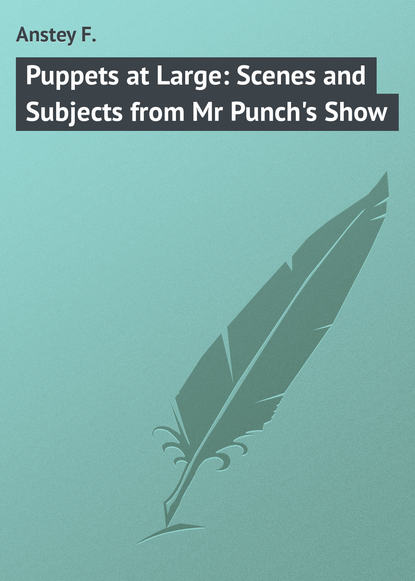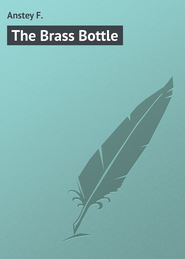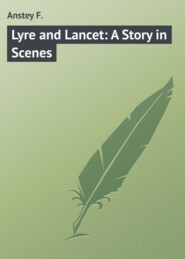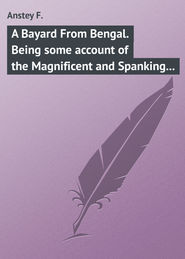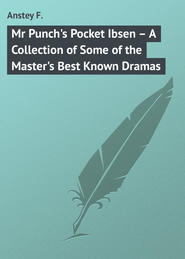По всем вопросам обращайтесь на: info@litportal.ru
(©) 2003-2024.
✖
Puppets at Large: Scenes and Subjects from Mr Punch's Show
Настройки чтения
Размер шрифта
Высота строк
Поля
The Hon. Diana D'Autenbas (to herself). It's rather fun selling at a Bazaar; one can let oneself go so much more! (To the first man she meets.) I'm sure you'll buy one of my buttonholes – now won't you? If I fasten it in for you myself?
Mr. Cadney Rowser. A button'ole, eh? Think I'm not classy enough as I am?
Miss D'Aut. I don't think anyone could accuse you of not being "classy;" still a flower would just give the finishing-touch.
Mr. C. R. (modestly). Rats! – if you'll pass the reedom. But you've such a way with you that – there – 'ow much.
Miss D'Aut. Only five shillings. Nothing to you!
Mr. C. R. Five bob? You're a artful girl, you are! "Fang de Seakale," and no error! But I'm on it; it's worth the money to 'ave a flower fastened in by such fair 'ands. I won't 'owl – not even if you do run a pin into me… What? You ain't done a'ready! No 'urry, yer know… 'Ere, won't you come along to the refreshment-stall, and 'ave a little something at my expense. Do!
Miss D'Aut. I think you must imagine you are talking to a barmaid!
Mr. C. R. (with gallantry). I on'y wish barmaids was 'alf as pleasant and sociable as you, Miss. But they're a precious stuck-up lot, I can assure you!
Miss D'Aut. (to herself as she escapes). I suppose one ought to put up with this sort of thing – for a charity!
Mrs. Babbicombe (at the Toy Stall, to the Belle of the Bazaar, aged three-and-a-half). You perfect duck! You're simply too sweet! I must find you something. (She tempers generosity with discretion by presentingher with a small pair of knitted doll's socks.) There, darling!
The Belle's Mother. What do you say to the kind lady now, Marjory?
Marjory (a practical young person, to the donor). Now div me a dolly to put ve socks on.
[Mrs. B. finds herself obliged to repair this omission.
A Young Lady Raffler (to a Young Man). Do take a ticket for this charmin' sachet. Only half-a-crown!
The Young Man. Delighted! If you'll put in for this splendid cigar cabinet. Two shillin's!
[The Young Lady realises that she has encountered an Augur, and passes on.
Miss de. M. (to Mr. Isthmian Gatwick). Can't I tempt you with this tea-cosy? It's so absurdly cheap!
Mr. Isthmian Gatwick (with dignity). A-thanks; I think not. Never take tea, don't you know.
Miss de M. (with her characteristic adaptability). Really? No more do I. But you could use it as a smoking-cap, you know. I always —
[Recollects herself, and breaks off in confusion.
Miss Ophelia Palmer (in the "Wizard's Cave" – to Mr. Cadney Rowser). Yes, your hand indicates an intensely refined and spiritual nature; you are perhaps a little too indifferent to your personal comfort where that of others is concerned; sensitive – too much so for your own happiness, perhaps – you feel things keenly when you do feel them. You have lofty ambitions and the artistic temperament – seven-and-sixpence, please.
Mr. C. R. (impressed). Well, Miss, if you can read all that for seven-and-six on the palm of my 'and, I wonder what you wouldn't see for 'alf a quid on the sole o' my boot!
[Miss P.'s belief in Chiromancy sustains a severe shock.
Bobbie Patterson (outside tent, as Showman). This way to the Marvellous Jumping Bean from Mexico! Threepence!
Voice from Tent. Bobbie! Stop! The Bean's lost! Lady Honor's horrid Thought-reading Poodle has just stepped in and swallowed it.
Bobbie. Ladies and Gentlemen, owing to sudden domestic calamity, the Bean has been unavoidably compelled to retire, and will be unable to appear till further notice.
Miss Smylie (to Mr. Otis Barleywater, who – in his own set – is considered "almost equal to Corney Grain"). I thought you were giving your entertainment in the library? Why aren't you? Mr. Otis Barleywater (in a tone of injury). Why? Because I can't give my imitations of Arthur Roberts and Yvette Guilbert with anything like the requisite "go," unless I get a better audience than three programme-sellers, all under ten, and the cloak-room maid —that's why!
Mrs. Allbutt-Innett (as she leaves, for the benefit of bystanders). I must say, the house is most disappointing – not at all what I should expect a Marquis to live in. Why, my own reception-rooms are very nearly as large, and decorated in a much more modern style!
Bobbie Patterson (to a "Doosid Good-natured Fellow, who doesn't care what he does," and whom he has just discovered inside a case got up to represent an automatic sweetmeat machine). Why, my dear old chap! No idea it was you inside that thing! Enjoying yourself in there, eh?
The Doosid Good-natured Fellow (fluffily, from the interior). Enjoying myself! With the beastly pennies droppin' down into my boots, and the kids howlin' because all the confounded chocolates have worked up between my shoulder-blades, and I can't shake 'em out of the slit in my arm? I'd like to see you tryin' it!
The L. O. L. (to a stranger, who is approaching thePrincess's stall). 'Ere, Mister, where are your manners? 'Ats off in the presence o' Royalty!
[She pokes him in the back with her umbrella; the stranger turns, smiles slightly, and passes on.
A Well-informed Bystander. You are evidently unaware, Madam, that the gentleman you have just addressed is His Serene Highness the Prince of Potsdam!
The L. O. L. (aghast). Her 'usban'! And me a jobbin' of 'im with my umbrella! 'Ere, let me get out!
[She staggers out, in deadly terror of being sent to the Tower on the spot.
THE CLASSICAL SCHOLAR IN REDUCED CIRCUMSTANCES
You are, let us say, a young professional man in chambers or offices, incompetently guarded by an idiot boy whom you dare not trust with the responsibility of denying you to strangers. You hear a knock at your outer door, followed by conversation in the clerk's room, after which your salaried idiot announces "A Gentleman to see you." Enter a dingy and dismal little man in threadbare black, who advances with an air of mysterious importance. "I think," he begins, "I 'ave the pleasure of speaking to Mr. – " (whatever your name is.) "I take the liberty of calling, Mr. – , to consult you on a matter of the utmost importance, and I shall feel personally obliged if you will take precautions for our conversation not being over'eard." He looks grubby for a client – but appearances are deceptive, and you offer him a seat, assuring him that he may speak with perfect security – whereupon he proceeds in a lowered voice. "The story I am about to reveal," he says, smoothing a slimy tall hat, "is of a nature so revolting, so 'orrible in its details, that I can 'ardly bring myself to speak it to any 'uming ear!" (Here you will probably prepare to take notes.) "You see before you one who is of 'igh birth but low circumstances!" (At this you give him up as a possible client, but a mixture of diffidence and curiosity compels you to listen.) "Yes, Sir, I was ' fruges consumeary nati.' I 'ave received a neducation more befitting a dook than my present condition. Nursed in the lap of haffluence, I was trained to fill the lofty position which was to have been my lot. But, 'necessitas,' Sir, as you are aware, 'necessitas non abat lejim,' and such I found it. While still receiving a classical education at Cambridge College – (praps you are yourself an alumbus of Halma Mater? No? I apologise, Sir, I'm sure) – but while preparing to take my honorary degree, my father suddenly enounced the horful news that he was a bankrup'. Stript of all we possessed, we were turned out of our sumchuous 'ome upon the cold world, my father's grey 'airs were brought down sorrowing to sangwidge boards, though he is still sangwin of paying off his creditors in time out of what he can put by from his scanty hearnings. My poor dear Mother – a lady born and bred – sank by slow degrees to a cawfy-stall, which is now morgidged to the 'ilt, and my eldest Sister, a lovely and accomplished gairl, was 'artlessly thrown over by a nobleman, to 'oom she was engaged to be married, before our reverses overtook us. His name the delikit hinstinks of a gentleman will forbid you to inquire, as likewise me to mention – enough to 'int that he occupies a prominent position amongst the hupper circles of Society, and is frequently to be met with in the papers. His faithlessness preyed on my Sister's mind to that degree, that she is now in the Asylum, a nopeless maniac! My honely Brother was withdrawn from 'Arrow, and now 'as the 'yumiliation of selling penny toys on the kerbstone to his former playfellers. 'Tantee nannymice salestibus hiræ,' indeed, Sir! "But you ask what befell myself." (You have not – for the simple reason that, even if you desired information, he has given you no chance, as yet, of putting in a word.) "Ah, Sir, there you 'ave me on a tender point. 'Hakew tetigisti,' if I may venture once more upon a scholarly illusion. But I 'ave resolved to conceal nothing – and you shall 'ear. For a time I obtained employment as Seckertary and Imanuensis to a young baranit, 'oo had been the bosom friend of my College days. He would, I know, have used his influence with Goverment to obtain me a lucritive post; but, alas, ere he could do so, unaired sheets, coupled with deliket 'elth, took him off premature, and I was once more thrown on my own resources. "In conclusion, Sir, you 'ave doubtless done me the hinjustice to expect, from all I 'ave said, that my hobjick in obtaining this interview was to ask you for pecuniary assistance?" (Here you reflect with remorse that a suspicion to this effect has certainly crossed your mind.) "Nothing of the sort or kind, I do assure you. A little 'uming sympathy, the relief of pouring out my sorrers upon a feeling 'art, a few kind encouraging words, is all I arsk, and that, Sir, the first sight of your kind friendly face told me I should not lack. Pore as I am, I still 'ave my pride, the pride of a English gentleman, and if you was to orfer me a sovereign as you sit there, I should fling it in the fire – ah, I should– 'urt and indignant at the hinsult!" (Here you will probably assure him that you have no intention of outraging his feelings in any such manner.) "No, and why, Sir? Because you 'ave a gentlemanly 'art, and if you were to make sech a orfer, you would do it in a kindly Christian spirit which would rob it of all offence. There's not many as I would bring myself to accept a paltry sovereign from, but I dunno – I might from one like yourself – I might. Ord hignara mali, miseris succur-reary disco, as the old philosopher says. You 'ave that kind of way with you." (You mildly intimate that he is mistaken here, and take the opportunity of touching the bell.) "No, Sir, don't be untrue to your better himpulses. 'Ave a feelin 'art, Sir! Don't send me away, after allowing me to waste my time 'ere – which is of value to me, let me tell yer, whatever yours is! – like this!.. Well, well, there's 'ard people in this world? I'm going, Sir … I 'ave sufficient dignity to take a 'int… You 'aven't got even a trifle to spare an old University Scholar in redooced circumstances then?.. Ah, it's easy to see you ain't been at a University yourself – you ain't got the hair of it! Farewell, Sir, and may your lot in life be 'appier than – All right, don't hexcite yourself. I've bin mistook in yer, that's all. I thought you was as soft-edded a young mug as you look. Open that door, will yer; I want to get out of this 'ole!" Here he leaves you with every indication of disgust and disappointment, and you will probably hear him indulging in unclassical vituperation on the landing.
RUS IN URBE
(A Sketch in Regent's Park.)
A railed-in corner of the Park. Time – About 7 p.m. Inside the enclosure three shepherds are engaged in shearing the park sheep. The first shepherd has just thrown his patient on its back, gripped its shoulders between his knees, and tucked its head, as a tiresome and obstructive excrescence, neatly away under one of his arms, while he reaches for the shears. The second is straddled across his animal, which is lying with its hind legs hobbled on a low stage under an elm, in a state of stoical resignation, as its fleece is deftly nipped from under its chin. The third operator has almost finished his sheep, which, as its dark grey fleece slips away from its pink-and-white neck and shoulders, suggests a rather décolletée dowager in the act of removing her theatre-cloak in the stalls. Sheep, already shorn, lie and pant in shame and shivering bewilderment, one or two nibble the blades of grass, as if to assure themselves that that resource is still open to them. Sheep whose turn is still to come are penned up at the back, and look on, scandalised, but with an air which seems to express that their own superior respectability is a sufficient protection against similar outrage. The shearers appear to take a humorous view of their task, and are watched by a crowd which has collected round the railings, with an agreeable assurance that they are not expected to contribute towards the entertainment. First Work-girl (edging up). Whatever's goin' on inside 'ere? (After looking – disappointed.) Why they ain't on'y a lot o' sheep! I thought it was Reciters, or somethink o' that. Second Work-girl (with irony). They look like Reciters, don't they! It do seem a shime cuttin' them poor things as close as convicks, that it do! First W. – g. They don't mind it partickler; you'd 'ear 'em 'oller fast enough if they did. Second W. – g. I expeck they feel so redic'lus, they 'aven't the 'art to 'oller. Lucilla (to George). Do look at that one going up and sniffing at the bundle of fleeces, trying to find out which is his. Isn't it pathetic? George. H'm – puts one in mind of a shy man in a cloak-room after a party, saying feebly, "I rather think that's my coat, and there's a crush hat of mine somewhere about," eh? Lucilla (who is always wishing that George would talk more sensibly). Considering that sheep don't wear crush hats, I hardly see how —
George. My dear, I bow to your superior knowledge of natural history. Now you mention it, I believe it is unusual. But I merely meant to suggest a general resemblance.
Lucilla (reprovingly). I know. And you've got into such a silly habit of seeing resemblances in things that are perfectly different. I'm sure I'm always telling you of it.
George. You are, my dear. But I'm not nearly so bad as I was. Think of all the things I used to compare you to before we were married!
Sarah Jane (to her Trooper). I could stand an' look at 'em hours, I could. I was born and bred in the country, and it do seem to bring back my old 'ome that plain.
Her Trooper. I'm country bred too, though yer mightn't think it. But there ain't much in sheep shearin' to my mind. If it was pig killin', now!
Sarah Jane. Ah, that's along o' your bein' in the milingtary, I expect.
Her Trooper. No, it ain't that. It's the reckerlections it 'ud call up. I 'ad a 'ole uncle a pork-butcher, d'ye see, and (with sentiment) many and many a 'appy hour I've spent as a boy – [He indulges in tender reminiscences.
A Young Clerk (who belongs to a Literary Society, to his Fiancée). It has a wonderfully rural look – quite like a scene in 'Ardy, isn't it?
His Fiancée (who has "no time for reading rubbish"). I daresay; though I've never been there myself.
The Clerk. Never been? Oh, I see. You thought I said Arden– the Forest of Arden, in Shakspeare, didn't you?





